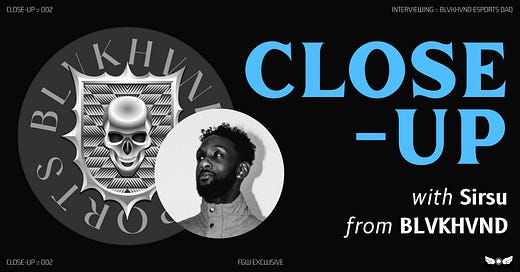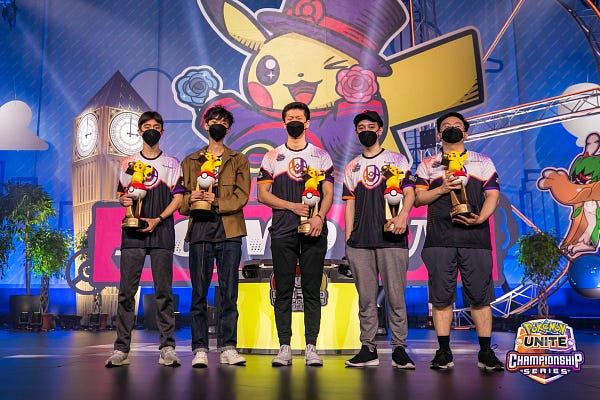Introducing BLVKHVND
During the pandemic lockdown of 2020, the founding members teamed up to compete in eSports and stream their collective experience. They all quickly came to notice the pitfalls players face when going pro, and so out of a need to better equip both players and organisations for success, BLVKHVND was born.
On July 29th 2021, Sirsu, MVGIC, Rolvel and Blvk0ut outlined their vision in an essay titled BLVKHVND – Building a Decentralised Gaming Community (dSports).
“At BLVKHVND, we’ve competed in leagues before. From GameBattles, MLG, Halo League, CDL, Pokemon, League of Legends, EVO, smash.gg and more.
We know what it means to play at a high level. We also know how fragmented and frustrating competitive leagues are as it relates to game interest level, lack of a player’s guild, high churn, team breakdowns, etc.
Based upon our collective experiences, we believe that there is a better way to create a competitive ecosystem where everyone wins.”
3 weeks later, they had raised 337.45ETH (representing over $1 million at the time) from 225 backers, the largest crowdfund to date on Mirror.
Despite being just over a year old, the collective is already delivering impressive results. On August 20th, a BLVKHVND team became the 2022 World Champions in Pokémon UNITE.
A couple of weeks ago, I spoke to co-founder Sirsu about this gaming collective focused on eSports and functioning as a DAO (Decentralised Autonomous Organisation).
With no further ado let’s dig in!
Interview
First off, could you please explain the term dSports (decentralised eSports)?
Sirsu: “dSports speaks to the culture of organising by means of community and operating on that pretence. We believe financial tooling will provide more equitable opportunities to players competing in eSports.”
The Problem
Sirsu: “eSports corresponds to $1.2 billion of the $200 billion gaming industry. Players aren’t typically incentivised to compete so maybe it’s up to players to take back control, for communities to assemble and create monetisation opportunities.
There are multiple issues regarding the economic unviability of eSports: tournament payments can take up to 6 months to arrive; unless you have sponsorships, it’s difficult to monetise; and there’s always a risk you’re competing in a game that won’t last.
What’s more is tournament prize pools are generally low. If 16 teams compete, 12 out of those will be unable to monetise, which means they’re operating at a loss given expenses (including travel). As a team, you can get your name out there but by the end of day 1 if you’re eliminated that’s it. You can also get merchandise sales and more, but by the end of day 2, only the top 4 teams are left. Even winners are operating at a loss until the tournament money comes in.”
So what does BLVKHVND do differently, how does BLVKHVND empower pro players?
Sirsu: “DAO contributors help bring financial support but also social support. There is a wide network in our community involving people from the teams at Xbox, PlayStation and more. It is clear to us that the traditional gaming industry is looking for case studies of web3 tooling working in an eSports context. Our community members act as important bridges to open up conversations with developers, product managers and more. Being part of a network is empowering since each member has agency to help the DAO grow.
When it comes to players, they need structure, especially if they’re competing, so we look into how we can provide stability within an unstable industry. To give you an idea, Pokémon Unite, the game for which we won the 2022 Championship, is brand new. There is no real guarantee that a game will last if there is a lack of publisher backing, impacting the stability of pro players and teams.
This is eSports for the culture – we invite and help any community or team to set up their own version of BlvkHvnd.”
Blockchain Tech provides ways for eSports teams and brands to Generate Revenue for themselves without relying on 3rd parties
Sirsu: “In a Web3 context, brands can reach out to fans directly. Blockchain tech provides ways for eSports teams and brands to generate revenue for themselves without relying on 3rd parties like in traditional eSports contexts. This can also open up arbitrage opportunities.
100 Thieves are a good example of this – they released championship NFTs on Polygon, a time-limited drop. 700k+ NFTs were minted! Fanatic also did something similar.”
What do you think about the model where players playing a game purchase NFTs and a % of those proceeds go to a prize pool which serves to pay pro players who are adding value to the game/IP?
Sirsu: “I like this model a lot. It allows a community to raise the stakes of tournaments. It also means tournaments become very big opportunities for money put in as well as for players to get hired, and organisations to find talent.
What’s cool is that the rise of sponsorships allows for cross-pollination between communities across the Web3 landscape. Blockchain means that there is a degree of transparency, so you can see where interest lies and bridge the gap. Identify opportunities.
Just look at the Web3-native brand Smilesss, they hosted a $10k Halo tournament and ended up attracting pro players [from teams including Sentinels, FaZe Clan and OpTic]. All they did was advertise via Twitter and leverage connections within their community.
At BLVKHVND, we’ve been able to operate in both the crypto space and Web2 thanks to our connections. Narrative framing and execution has earned us respect. This is rewarding work too, even the small wins because they motivate the community to replicate wins and gain more visibility.”
Can you tell me more about STADIUM?
Sirsu: “STADIUM is an expansive protocol and platform that brings agency to esports players and organisations. Our goal is to, through transparency, allow the space of esports to become funner and more engaging to participate in – players can set their own value, teams can match and negotiate that value, tournament organisers have free reign in determining the type of competitive markets and environments they see fit.
Being able to see the stratification of market value between pro and amateur players I think is very important. Otherwise you have a lot of folks that want to start esports organisations but can’t necessarily be competitively viable since they don’t know the cost of players within a particular space. On top of certain player salaries being hyper-inflated whilst playing at games which don’t reward enough for it to make sense financially.”
Links
BLVKHVND :: Twitter – Website – Twitch – YouTube
Frontier Gaming Watch :: Twitter – Newsletter










